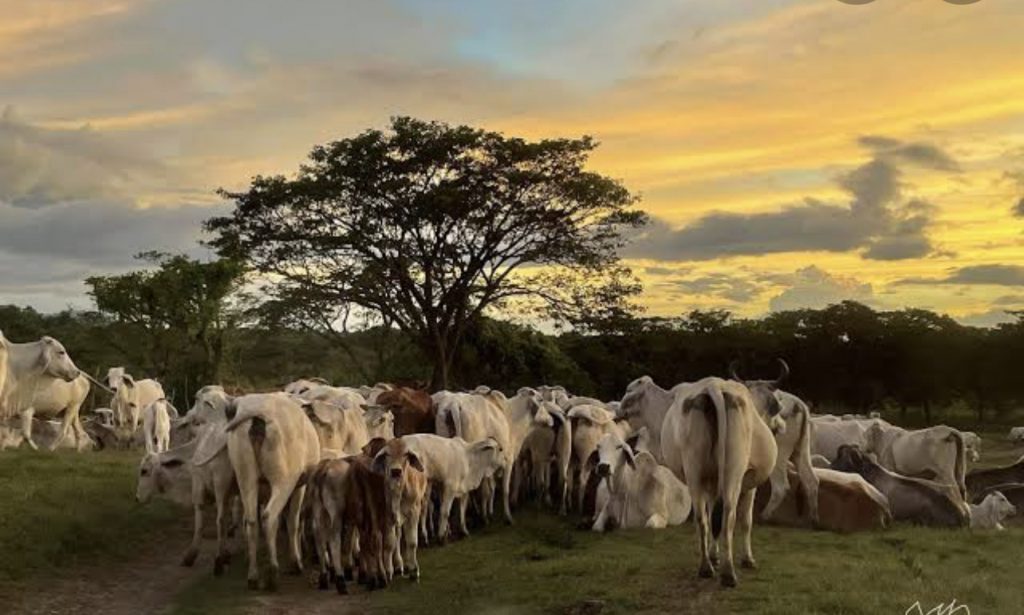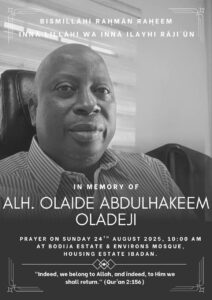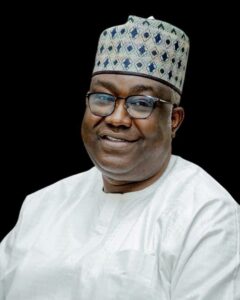Cattle Rearing and Matters Arising in Nigeria’s Political Economy By Olaide Omideyi

Cattle rearing has traditionally been regarded as an exclusively northern activity with the Fulanis predominating the business.
The cattle value chain is a multi-billion Naira business employing thousands of people with prospects to grow even bigger.
The biggest hurdle to this envisaged development is the dogged opposition of cattle rearers and dealers in Nigeria under their umbrella organisation, Miyetti Allah Kautal Hore or simply Miyetti Allah, to moving the cattle value chain into the modern age by adopting ranching methods instead of the traditional open grazing favoured by cattle herders moving long distances with their herds to source for pasture and water.
The activity of herders has created serious security challenges with the impunity of herdsmen moving their animals into people’s farms and not only destroying farms, but killing the farmers who resisted their incursions. The problem has become perennially intractable with both sides engaged in conflict. The herders have refused to embrace ranching which is the most rational approach to end the issue of insecurity for various reasons.
The most popular defence of open grazing is sociocultural. We are told that because it is a lifestyle, a way of life of the Fulani, it cannot be changed.
One of the key characteristic of culture however is dynamism. Cultures are always evolving and never stagnant, meaning that the movement from open grazing to ranching by cattle herders could still be called a cultural paradigm shift. However, the biggest reasons why the cattle dealers are reluctant to adopt ranching transcend the sociocultural. Their opposition to ranching goes beyond lifestyle and is more of economic domination of the sector and political posturing because of access to the corridor of power at the highest levels.
This article will therefore try to outline the economic and political reasons for the opposition of Miyetti Allah to ranching and its preference for the continuation of open grazing in spite of its negative blowback for the Fulani ethnic group and a major source of insecurity in the country.
Miyetti Allah understands the dynamics of ranching and its economic benefits but aware they are not prepared nor equipped to take advantage of those benefits right now and that eventually, the southerners will end up taking over the cattle value chain and breaking their generational monopoly over cattle trading in Nigeria.
An estimated 95 percent of all cattle traded in Nigeria are sold in the south (using government figures). This figure will not change significantly if ranching is introduced meaning, the dangers foreseen by Miyetti Allah and the other interest groups will not disappear. The products from the value chain like milk, cheese, butter, corned beef, packaged beef, yogurt, bone marrow and bone meal among others are also going to end up in the south because of the superior purchasing power of the south and location of most manufacturing capacity lying in the south.
Introduction of ranching will inevitably lead to introduction of new and better cattle breeds that will be superior to the present breeds being traded in Nigeria in terms of milk production capacities and better beef quality.
It’s not only about controlling the cattle business. It is about controlling the consumption patterns and choices available to a certain section of the country and using political influence to sustain this status quo. The recent failed food embargo placed on the south was an attempt to blackmail the south into accepting open grazing as a precondition for selling agricultural products from the north.
The major fear of groups like Miyetti Allah is that Southerners will also get into ranching and bring in better cattle breeds that will outperform the breeds favoured by the Fulani. To put this fear of entry of southerners in perspective, a single Freisian cow can produce 40 litres of milk per day. Compare this to the Gidale or Bokolo, what you get is 1.5 to 2 litres per day. The Angus, Hereford, Limousin breeds are far better when it comes to quality beef production. They mature within 18 months and their meat taste better than the stringy, sinewy meat of the Fulani cattle breeds.
95 percent of all cattle sales take place in the South. As at 2018 and using official Lagos state government figures, 6000 cows are slaughtered daily in Lagos. Add 25 percent for unofficially slaughtered animals and you have roughly 8000 cows traded daily in Lagos alone. The comparative figures for Kano is 392 daily slaughter for cows. If you add the figures for the whole south and using an average profit of 30k per animal which is very conservative, you have 250 million Naira profit being made daily in Lagos and around 200 billion Naira per annum in the south.
What is currently happening therefore goes beyond insecurity and Fulani herdsmen. It is a struggle for the economic soul of the southern part of the country and a crude and brazen attempt to control and retain an ancient monopoly that is clearly in danger of being broken.
The advantages of ranching will be felt more in the South because of the superior purchasing power and location of industries that are concentrated more in the south than up north.
Once ranching becomes an official policy, there will be no way to stop southerners from participating in it, doing it better and squeezing the Fulani out of the gargantuan profits they are making from the business.
Without the ability to profiteer from cattle through monopoly, the political influence of groups like Miyetti Allah will wane seriously. They won’t have access to almost limitless funds to lobby and create problems. Not being able to influence what is happening in the political sphere will effectively sound the death knell of Miyetti Allah and the other groups once and for all.
The realisation that huge profits could be made from the cattle value chain will encourage the entry of competitors who will provide the capital, employ the necessary qualified manpower and advertise aggressively to drive the Fulani out of the cattle business they consider their heritage.
All that is required to make sure the above ‘doomsday’ scenario of pushing the Fulani out of what they consider their natural patrimony does not happen is the alignment of political power, ethnic solidarity and religion to suppress the calls for ranching.
Buhari is a Fulani and believe that their hegemony over cattle rearing and trading in Nigeria must be protected at all costs. Most importantly, Buhari has the political power as president to ensure all efforts to introduce ranching and set in motion series of events that will lead to what the Fulanis fear most do not happen.
All the insecurity happening in the south are part of the grand plan to postpone the evil day (for Fulani) of ranching. The foreign herdsmen will only be called to order if they are sure their monopoly over cattle trading will not be challenged by southern business men and women.
The arguement about open grazing being the best because it keeps beef prices within reach of ordinary Nigerians is as silly as economic explanations go. Everyone knows that with ranching, beef prices will rise sharply in the short term but stabilize in the medium and long term as high profit margins encourage entry of more players into the sector, thereby fueling competition and ultimately engendering value pricing.
Moreover, hundreds of real jobs will be created with establishment of ranches all over the country. The belief in most quarters is that most of these jobs will go to southerners. Perversely, one could also say that the fear of hundreds of thousands of real jobs being created in the north will loosen the grip of the northern political elites who have been using poverty as a means of controlling the masses.
From a realistic perspective, most Nigerians would rather pay higher prices for beef and be safe from attacks than eat cheap beef and be killed.
It is obvious that the government is not sincere about cattle-related insecurity and its linkage to maintaining the monopoly of a certain ethnic group over cattle business in the country. Asking state governments to provide free land for cattle colonies is an attempt to ensure the monopoly is not broken. No one in government has mentioned providing land for other Nigerians interested in ranching or for any other business ventures. They want to provide land to a certain ethnic group to keep the prices low and ensure the barrier to entry to ranching for other groups is maintained.
The bigger fear of Miyetti Allah is, if ranching works in Nigeria, other African countries will have no alternative than to adopt it as a panacea for solving the perennial farmer-herder conflicts. Adoption of ranching across West Africa will not only diminish the economic influence of the Fulani ethnic group, but it will also diminish their political influence and block a stable source of income for established cattle dealers and middlemen.
Still on the political aspect of ranching in Nigeria, the Fulani, through their various associations and groups are also.working assiduously to ensure no new government comes in to change the status quo and will be very much interested in governorship candidates and those vying for.positions to the National assembly to support those they feel will work with them to protect their interests. We shall witness more brazen support and funding of candidates by groups like Miyetti Allah and similar others.
All hands will be on deck to work for the victory of amenable candidates in 2023 if Buhari cannot get tenure extension. This speculation makes the rumoured Jonathan/Elrufai ticket more plausible.
Jonathan will be expected to sign an undertaking not to rock the boat on open grazing and Elrufai will be there to protect the interests of the Fulani. If Jonathan tries to do something funny, impeachment proceedings or an accident would be arranged for him and Elrufai becomes the president.
Southern governors have a mountain to climb to make their bam on open grazing work effectively since the president and the people around him are working assiduously to ensure the status quo of open grazing is maintained. The call for ‘grazing routes’ to be reestablished was a not subtle attempt by the president to let the southern states know where his loyalty lies on the issue.
Those talking about ‘One Nigeria’ also need to understand that the concept itself is what the northern oligarchs calls it. Nigeria must be a country where they are able to call all the shots, including deciding who becomes leader and do their bidding
Miyetti Allah will not easily give up its privileges under this government and it will take someone neutral to put them in their right place as a ‘sociocultural’ organisation.
The solution is to economically undermine Miyetti Allah through legislation against open grazing in the south of Nigeria, campaign to sensitize against openly grazed cattle and to develop ranches with better breeds in the south. Southern states must also establish a certification system for cattle being slaughtered in the south. Each one must have a certificate certifying that it was ranched and not from open grazing with punitive measures for violators.
Miyetti Allah must be caged if Nigeria is to have peace.
Olaide Omideyi is a conflict management, post-conflict reintegration and economic development expert with over two decades experience with international organisations including the United Nations. He writes from Abeokuta, Ogun state and can be reached on +2347032356295, omideyi3259@gmail.




